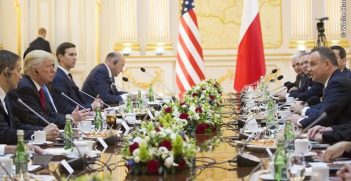More than four months after Germany’s federal election, the country’s two leading parties have finally agreed to form another ‘grand coalition’. So why is nobody cheering?
Few see the continuation of Angela Merkel’s previous government as an exciting prospect. Although the ‘grand coalition’ or ‘GroKo’ option was one of only two coalition formations with a potential majority in parliament, it was soon branded a ‘coalition of losers’. The GroKo parties—the Christian Democratic Union (CDU), the Christian Social Union (CSU) and the Social Democratic Party (SDP)—all lost votes in last September’s election. The latest polls on voting intentions and the party leaders’ personal ratings show that they are still falling.
Moreover, the GroKo will only take office if the policy program agreed to by the party leaders is formally adopted by the SPD party membership. Between a coalition agreement that favours the union parties (the CDU and CSU) in many key areas and a militant and determined anti-GroKo movement within the SPD, it is by no means certain that the membership’s agreement will be forthcoming.
Waiting for GroKo
The SPD has laboured under a tangle of conflicting pressures over its role in the GroKo. SPD leader Martin Schulz prevaricated for weeks, severely testing his credibility and arguably compromising his ability to lead his party.
Schulz’s failures opened up a can of worms within the party. They also mobilised a grassroots anti-GroKo movement under the leadership of the radical ‘Young Socialists’ (Jusos). In December 2017, the party conference’s crucial endorsement of the GroKo talks squeaked through with a narrow majority. Inspired by UK Labour’s Momentum movement, more than 24,000 new members—mainly anti-GroKo—joined the SPD before the deadline of 6 February in the hope of influencing the party membership’s deciding vote in the coming weeks.
Persuading the SPD grassroots
Some SPD members oppose the GroKo on principle. Others dread the prospect of another parliamentary term without significant policy alternatives. There is little hope that Merkel’s ‘same old, same old’ approach will change and this threatens to dilute the SPD’s main election promises. While polls show that a majority of SPD voters (60 per cent) supports the GroKo, significant compromises have been made to reach a deal. Many party members will not view the concessions kindly.
The two policy areas that tested the negotiators in the final days—health and labour policy—encapsulate the different visions for German society embraced by the union parties and the SPD respectively. The union parties wanted to preserve a neoliberal capitalist model that allows the wealthy to pay their way to better provision, while the SPD wanted root-and-branch reforms.
Within the health service, the SPD wanted to introduce a national health insurance scheme to end a two-tier health service that favoured those with private health insurance. It also wanted to ban medical professionals from charging more for private services. Measures included in the coalition agreement include additional funding to upgrade healthcare provision for poorer communities and to shift the balance of insurance costs from the individual to the employer. However, they stop short of the more fundamental reform foreseen by the SPD.
The SPD also wanted to ban employers from issuing fixed contracts without specific justification and to protect family life by requiring larger employers to offer a one-off, time-limited period of part-time work to employees. The negotiators agreed to limit the use of unjustified fixed contracts and to ban the repeated use of such time-limited contracts. The SPD also secured minor concessions on the right of return to full-time employment after a period of part-time work. As part of the coalition deal, the SPD gains control of the Ministry for Labour and Social Affairs. This has been greeted as a triumph for the SPD, but could also mean it will carry the can for the GroKo’s half-hearted reforms.
The SPD membership may also baulk at voting for the GroKo’s immigration and taxation deals. They will be dismayed, if not entirely surprised, to see the Ministry of the Interior go to the right-wing CSU. This ministry includes the controversial domain of immigration. For some SPD members, the coalition agreement on refugee quotas and on family reunion will amount to an attack on foreign incomers’ human and civil rights.
The interior ministry will also gain a new brief on “Heimat”, a concept of homeland policy that focuses on Germanness and German identity. Many SPD members will read this as a licence to pursue policies that discriminate against foreigners. The SPD’s longstanding aim to bring in a wealth tax was knocked back at an earlier stage of the negotiations. They had wanted to increase the highest tax band from 42 per cent to 45 per cent while simultaneously raising the annual income threshold for this band from earnings of just under €55,000 to €60,000 (AUD$86,000 to AUD$94,000).
During the election campaign, Schulz swore he would not serve in a Merkel government. Now he has announced that he will accept the post of foreign minister—ousting the popular Sigmar Gabriel—and give up the party leadership to his deputy, Andrea Nahles. While his departure from the top party post will reassure many party members, a new leader may not be enough to convince the party grassroots over the prospect of another spell in office with the CDU and CSU.
Dr Patricia Hogwood is a reader in European politics in the Department of Politics and International Relations at the University of Westminster.






